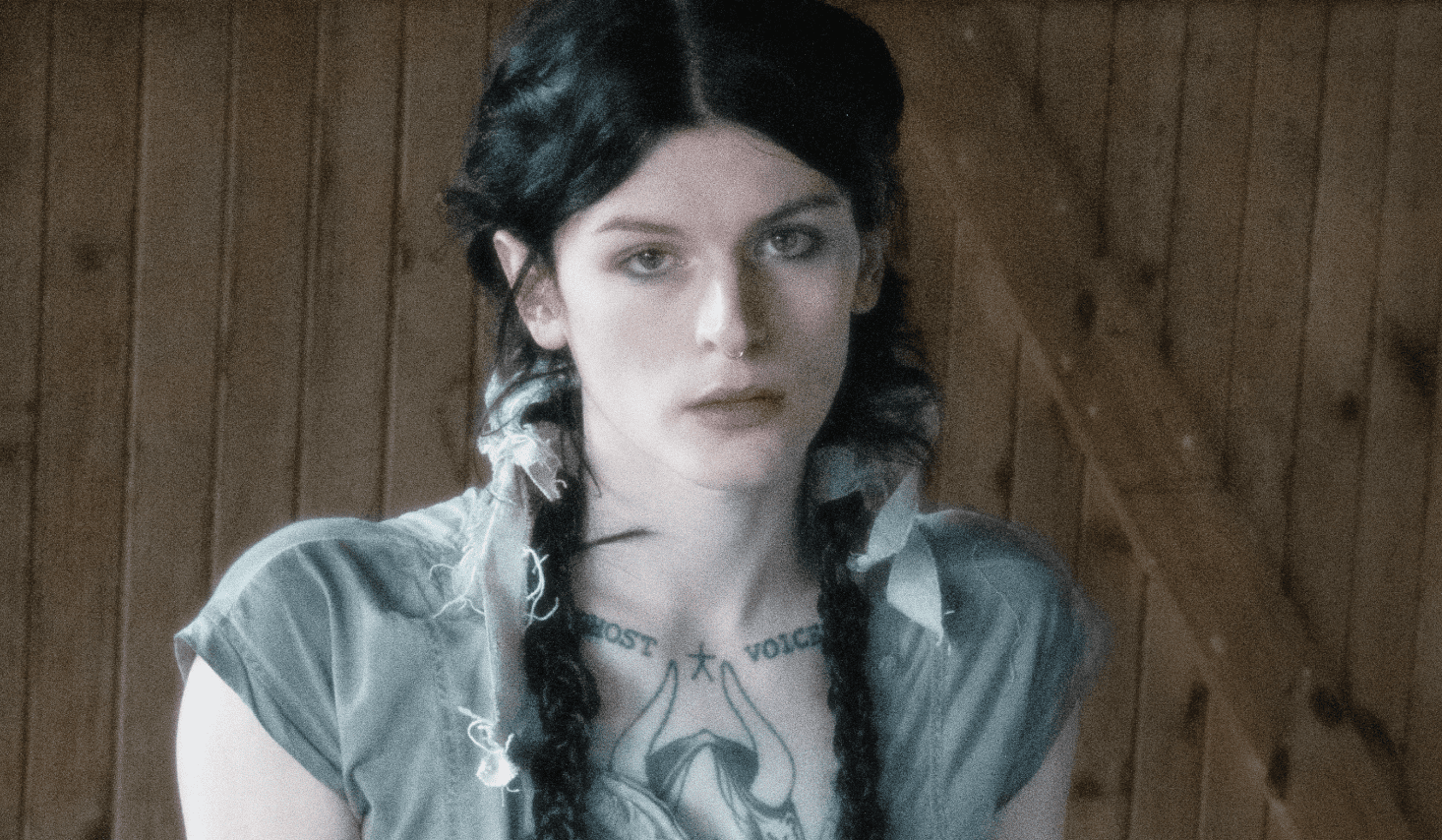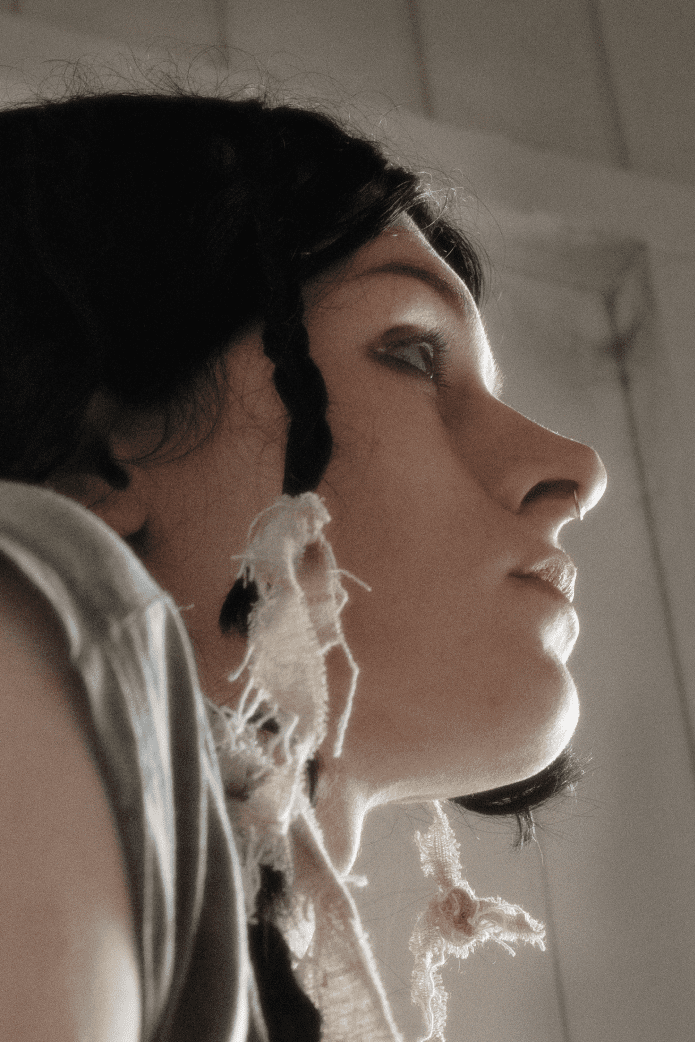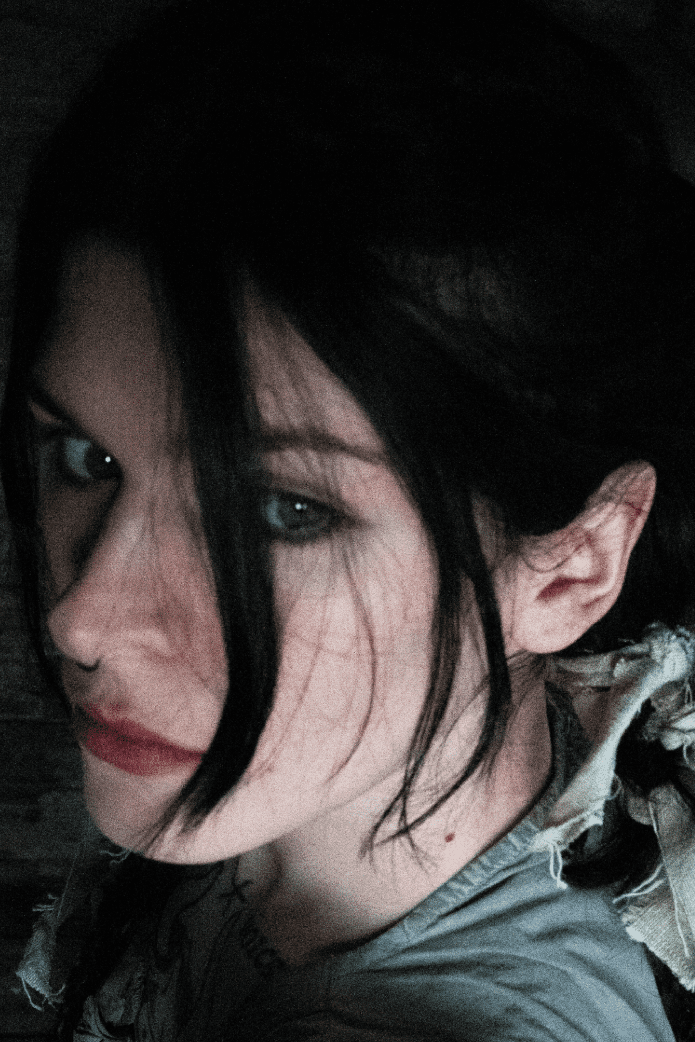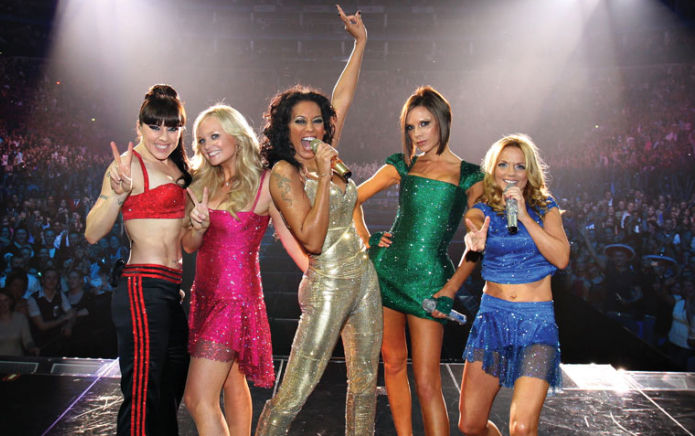
It’s mid-January and KAVARI’s face flashes up on Zoom, framed by the pale light of her laptop, but otherwise shrouded in darkness. At 24 years old, the musician has struck an amusing balance between mystery and point-blank frankness online. While her sound is often enveloped in crunchy textures and immense dark synths, her internet persona is something between Gen Z emocore and witty frankness. “People mentioning my Twitter in real life is like a jumpscare,” she casually tweeted.
Details, for KAVARI, are important, they’re imprinted in her work, bringing her aesthetic, image, and sonic landscape into one. So, as KAVARI appears on-screen –nails painted black and in a muddy brown shirt– her demeanour is mellower than what you would expect.
Although a stark contrast to the looming, corset-wearing noisemaker we caught opening for Ethel Cain’s London show, KAVARI is still the familiar electro-creative carving out her own name. While known for her gaming-style beats and jarring atmospheric tunes, the Glaswegian artist isn’t seeking out labels to fit her sound. Instead, she’s looking for what feels right. “For the most part, all my projects are ‘this is me’,” KAVARI confidently outlines.
For the first instalment of our monthly new music editorial series, Queer & Now, we find out what shapes KAVARI’s sound, how she became internet friends with Ethel Cain and more.
KAVARI, hello! It’s great to have you as part of GAY TIMES’ first-ever Queer & Now feature. Can you tell us a little bit about yourself and how you got your start in music?
My name is KAVARI and my real name’s Cameron. I’m an artist currently based in Glasgow. I spent the majority of my early years in quite a rural town in North Scotland. I got into music when I was really young and into DJing when I was about 11 or 12, but didn’t start producing until I was about 17, and have just been kind of messing around since. There’s not really a cohesive plan! I’m just creating stuff and seeing how it goes.
Your sound is expansive, textured and quite immersive. How did you refine the characteristics of the music you make?
It’s like [going into] overtime kind of learning. My ear picked up on the sounds I like most. I like my sounds textural and guttural. Even though they’re synthetically made within a synth, I really like sounds that seem like they could be a horror movie monster or something along that vibe. With the Ethel shows, I didn’t know what to play because Hayden’s music contrasts with mine, but I tried to keep it scary. Scary, but fun.
You’re currently based in Glasgow, do you feel connected to the music scene there?
Glasgow has the best music scene in Scotland. I’ve lived in other cities and it’s missing diversity like in Aberdeen. It’s the same with Edinburgh sometimes, but I find Glasgow has a lot of variety. It’s got a really good queer scene. It’s an expansive place for music and art. So, I ended up because I’d heard about Glasgow and was like that’s the place I need to be right now. In the future, I could see myself somewhere like London or Berlin.
Online you’ve talked about the difficulty of being an independent artist, not having a discography as fully formed as you’d like. How are new creatives limited by not having resources or contacts that others might have?
If you want to make a project and create a music video, but you don’t have the funding, it’s like you’re missing out on that opportunity and won’t be able to actualise what you properly want to do fully as an artist. There are some artists I know who have an extremely cohesive discography. From the first release, you can almost see the plan of action like merch that goes along with their releases, videos, and all these different elements. Smaller artists miss out on that opportunity to fully flesh out ideas because of [lack of] time and resources.
People that have funding have the privilege of hiding their mistakes. When you have the money, you have the time, you have the resources to carefully plan [your career] out, and focus purely on [your] projects. Whereas, if you don’t have that and you’re a smaller, independent artist, it’s all of your own back.
How do you hope attitudes towards independent artists will shift?
You just have to constantly be progressing forwards. I’m doing quite well for myself, but there’s so much more I want to do. But I know that there are certain things at certain points in my career, I won’t be able to actualise fully. I’ve been putting off my debut album for a while because I know that with time, I’ll get better. So, I’m almost putting it off, because I know that maybe in a couple of years time, I’m gonna have more insight into what I want to do than I do now.


You’ve described yourself as “an artist first producer second”. What does that mean to you?
I’m not a genre producer. I like to make things first and then production is the main thing that I do. I want to do like a lot more than music in the sense like I’d love to do film. I’d love to do more visual art performance art, but producing is what I can do well. I don’t want to be limited to what people know me as. I want to be able to [present] a really good cohesive project that I’ve made, regardless of what I’ve made in the past.
You’ve also worked with the incredible DJ TAAHLIAH. How did you both end up collaborating?
It was back in 2019. I was living in Aberdeen and I saw that SOPHIE was playing a show at The Art School and I saw that TAAHLIAH was supporting it. I followed her and messaged her asking about set times and we followed each other from then. Then when TAAHLIAH was working on Angelica, she messaged me saying we should make something together. And, so, through the internet, we became friends. It’s really funny actually, she lives around the corner from me like 10 minutes away.
You’ve released a handful of EPs and you’re doing live shows at the minute. What’s been your biggest career achievement to date?
There are a few that I have that I don’t think I’m allowed to speak about, but I have some songs that I’m working on with some producers that I’ve listened to since I was like a teenager, which is really, really crazy. It’s so annoying, I’m not allowed to say things!
Speaking of touring, you also opened for Ethel Cain at Heaven in London. What was that experience like?
Hayden was telling me that when she was doing her Europe tour and she was asked about the openers, she knew that she wanted me as an opener and based the other openers, for that tour, around me.
Then for Heaven, she had messaged me about it months in advance saying she really wanted me to support her in London. The experience was really intimidating in the sense that Hayden’s fans are very obsessed with her and all these people in these big rooms have this really deep connection to the artist. I had a bit of performance anxiety of ‘I hope they like me’, but it went really well. I feel as though it was one of my best performances in the sense that it felt very fulfilling.
There’s talk that you’re working on a new project. What can you share about what you’ve got coming up?
I’ve not put any solid plans down beyond a name that I want to work towards. Normally, I come up with a name first and a setting and visual inspiration, and then I’ll build the music on top of that. I think I’m going to release a single soon of a song that I made last summer. I sat on it for a while and thought that it was really good. So, I’m sorting artwork for it, and might do a visual thing to go along with it and then release it in the next couple of months.
What are your big career hopes for 2023?
My number one thing is that I want to start playing international shows. That’s like one of my top priorities. I want to be working more too. Last year, I didn’t have much time to focus or do as much as I wanted to. Now, I already have quite a lot planned. So, I just want to go with the flow and keep that progress.
